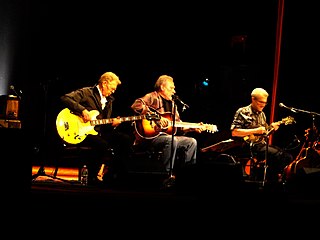
Hot Tuna is an American blues band formed in 1969 by former Jefferson Airplane members Jorma Kaukonen (guitarist/vocals) and Jack Casady (bassist). Although it has always been a fluid aggregation, with musicians coming and going over the years, the band's name has essentially become a metonym for Kaukonen and Casady's ongoing collaboration.

Jorma Ludwik Kaukonen, Jr. is an American blues, folk, and rock guitarist. Kaukonen performed with Jefferson Airplane and still performs regularly on tour with Hot Tuna, which started as a side project with bassist Jack Casady, and as of early 2019 has continued for 50 years. Rolling Stone magazine ranked him #54 on its list of 100 Greatest Guitarists.

John William "Jack" Casady is an American bass guitarist, best known as a member of Jefferson Airplane and Hot Tuna. Jefferson Airplane became the first successful exponent of the San Francisco Sound. Their singles, including "Somebody to Love" and "White Rabbit", had a more polished style than their other material, and successfully charted in 1967 and 1968. Casady, along with the other members of Jefferson Airplane, was inducted into the Rock and Roll Hall of Fame in 1996.

Bark is the sixth studio album by American rock band Jefferson Airplane. Released in 1971 as Grunt FTR-1001, the album is one of the Airplane's late-period works, notable for the group's first personnel changes since 1966. The album was the first without band founder Marty Balin and the first with violinist Papa John Creach. Drummer Spencer Dryden had been replaced by Joey Covington in early 1970 after a lengthy transitional period in which both musicians had performed with the band.

Long John Silver is the seventh studio album by the American rock band Jefferson Airplane, and their last album of all new material until 1989. It was recorded and released in 1972 as Grunt FTR-1007.

Hot Tuna is the self-titled debut album by the American blues rock band Hot Tuna, released in 1970 as RCA Victor LSP-4353. It was recorded live at the New Orleans House in Berkeley, California in September 1969. It peaked at #30 on the Billboard 200 album chart.

Burgers is the third album by Hot Tuna, the folk rock offshoot of Jefferson Airplane members Jorma Kaukonen, Jack Casady, and Papa John Creach, released in 1972 as Grunt FTR-1004. It was the band's first studio album, the previous two being live recordings. "Water Song" and "Sunny Day Strut" are instrumentals composed for this album. Hot Tuna did not release the song as a single until June 1982. In 1996, RCA released the CD box set Hot Tuna in a Can which included a remastered version of this album, along with remasters of the albums Hot Tuna, First Pull Up, Then Pull Down, America's Choice and Hoppkorv.
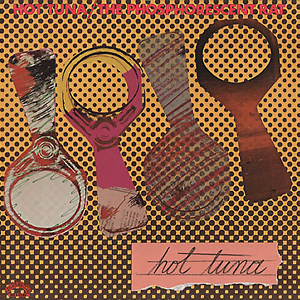
The Phosphorescent Rat is the fourth album by the blues rock group Hot Tuna, released in early 1974 as Grunt BFL1-0348. This was the first Hot Tuna album recorded after guitarist Jorma Kaukonen and bass player Jack Casady had left Jefferson Airplane. They were joined as before by drummer Sammy Piazza, though Papa John Creach had left the band for Jefferson Starship. The band's playing was moving away from the softer, more acoustic sound of their first three albums, and towards a hard rock sound that would be explored on their next three albums.

Yellow Fever is the sixth album by the American blues rock band Hot Tuna, recorded and released in 1975 as Grunt BFL1-1238. The album was also released in Quadraphonic as Grunt BFD1-1238. The album rose to #97 on the Billboard charts.
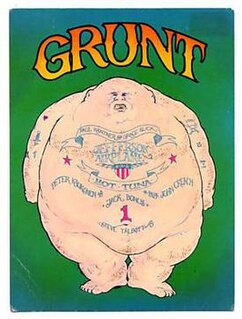
Grunt Records is a vanity label founded in 1971 by Jefferson Airplane and distributed by RCA Records. Initially created to sign local Bay Area acts, the label later was used only for Jefferson Starship and Hot Tuna releases. The label ended use in 1987 after Grace Slick left Starship.

First Pull Up, Then Pull Down is the second album by Hot Tuna, released in 1971 as RCA Victor LSP-4550. The album was recorded live with electric instruments, instead of the acoustic instruments used on the previous album, Hot Tuna. The album rose to #43 on the Billboard charts. In 1996, RCA released the CD box set Hot Tuna in a Can, which included a remastered version of this album, along with remasters of the albums Hot Tuna, Burgers, America's Choice and Hoppkorv. In Canada, the album reached #30 in the RPM Magazine charts where it was shown as Hot Tuna Electric Recorded Live.

Hoppkorv was the seventh album by the American blues rock band Hot Tuna, and their last studio album recorded for Grunt Records, as Grunt BFL1-1920. Unlike previous albums, Hot Tuna relied entirely on an outside producer for this effort, Harry Maslin. In addition to four new original songs by Jorma Kaukonen and one by Nick Buck, the album includes covers of Buddy Holly's "It's So Easy", Muddy Waters' "I Can't Be Satisfied", and Chuck Berry's "Talkin' 'Bout You." The album had its highest peak at #116 on the Billboard charts. In 1996, RCA released the CD box set Hot Tuna in a Can which included a remastered version of this album, along with remasters of the albums Hot Tuna, First Pull Up, Then Pull Down, Burgers and America's Choice
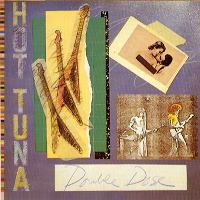
Double Dose is the eighth album by the American blues rock band Hot Tuna, and their third live album. The album was originally released as a double-LP as Grunt CYL2-2545. After their 1977 tour, Jorma Kaukonen moved on to a solo career and Jack Casady joined the new wave band SVT. Hot Tuna would not perform together again until 1983. The album had its highest peak at #92 on the Billboard charts.

Pair a Dice Found is an album by the American blues rock band Hot Tuna. Released in 1990, it was their first studio album since Hoppkorv in 1976.

Final Vinyl is a Hot Tuna compilation album. At the time the album was assembled, Jorma Kaukonen and Jack Casady had stopped performing together and were on to newer endeavours. Kaukonen recorded a solo album, Jorma, and Casady joined the band SVT. Kaukonen signed to RCA Records and Casady moved to 415 Records. This marked the end of Hot Tuna on the Jefferson Airplane owned Grunt Records, so a "final" compilation album was assembled. Kaukonen and Casady reunited to perform as Hot Tuna in 1983 and moved to the Relix Records label, where they released material until the late 1990s.
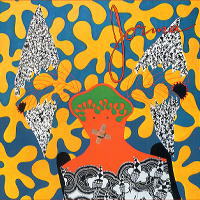
Jorma is the second solo album by Jorma Kaukonen of Hot Tuna and Jefferson Airplane. Hot Tuna had stopped touring in 1977 and Jack Casady had moved on to the band SVT. Bill Thompson and the staff that had managed Hot Tuna and still managed Jefferson Starship in 1979 continued to manage Kaukonen. David Kahne was hired to produce and the new solo album was released on RCA. The album consists entirely of Jorma's own vocals and his own electric and acoustic guitar work with many original songs written by Kaukonen. The last track is a poem recited by Kaukonen with no instrumental backing.
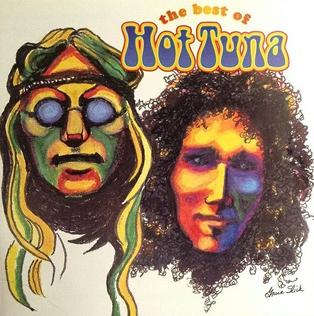
The Best of Hot Tuna is a Hot Tuna compilation album released in 1998. It covers songs from all the Hot Tuna albums released on Grunt Records. Bill Thompson, former manager of Jefferson Airplane and Hot Tuna helped select the songs for inclusion. The artwork on the cover is a painting of Jorma Kaukonen and Jack Casady made by Grace Slick. The album was released as a double CD.
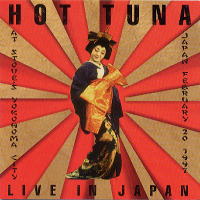
Live in Japan is a live album by Hot Tuna recorded in 1997 in Yokohama, Japan. Originally the band planned to play an electric set as part of their Japanese tour, but the venue in Yokohama was too small and there wasn't any room for an electric setup. The band played acoustic, and afterwards Jack Casady suggested to Jorma Kaukonen that the recording was good enough for a new live album. Michael Falzarano and Kaukonen listened to the tape and decided that Casady was right, and a new album was released. The album was Hot Tuna's last release on Relix Records. In 2004 Eagle Records remastered the album and re-released it with previously unreleased performances of "Parchman Farm", "Follow the Drinking Gourd", "Keep Your Lamps Trimmed & Burning" and "Folsom Prison." Three of the tracks from the initial release were dropped from the remaster: "Hesitation Blues", "Candy Man" and "Keep on Truckin'".

Splashdown is a Hot Tuna album released in 1984 containing the tracks from a previously unreleased live acoustic performance that had been played on the short-lived radio station WQIV in the mid-1970s. During the recording, news of the Apollo-Soyuz mission returning to Earth after the first USA-USSR rendezvous in space reached the station, and the astronauts' radio transmissions were played at the same time as Jorma and Jack continued with "Police Dog Blues." The transmissions mixed with the song were preserved for this release as the last track of side 1. The album was Hot Tuna's first release on Relix Records, and one of the first Relix releases. Jorma Kaukonen was signed on as a solo artist to the label as well. In 1997 an expanded version of the album was released as Splashdown Two.
Peter Kaukonen is an American guitarist/multi-instrumentalist/songwriter based in the San Francisco Bay Area. He is the younger brother of Jorma Kaukonen from Jefferson Airplane and Hot Tuna. Peter Kaukonen has played, toured, and recorded with Jefferson Airplane, Jefferson Starship, Hot Tuna, Johnny Winter, Link Wray, Terry Allen, Ruthann Friedman, as well as his own band, Black Kangaroo.


















